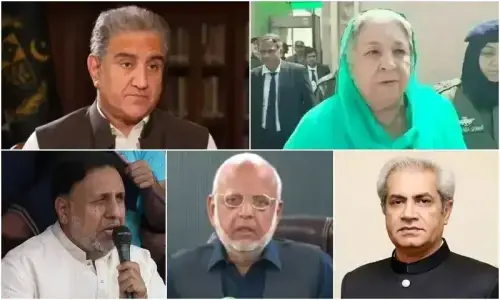A FRIEND is the editor of a going-to-places web-based literary magazine associated with an online workshop for South Asian writers. It’s run on a voluntary basis.
The team recently received an invitation to participate in an international literary festival, an affirmation of its hard work and dedication. But like most such invites, there were no cash grants or air tickets in attendance.
The magazine team’s challenge: where to raise the funds to allow them to travel and participate in an event that would without doubt help internationally highlight their work?
A roomful of people were discussing this. There were people who (in Pakistan) produce artwork and theatre, work in the film industry and who have been published or are hoping to soon find publishers.
They couldn’t come up with any concrete source that the magazine editor could apply to. No government grant for upcoming artists, no aid organisation that focuses on literature and the arts, no private-benefactor fund dedicated to holding out a helping hand — on the basis of merit — to people who contribute to this country’s culture.
I can’t think of any either. I can think of scholarships to arts education institutions, help and funding provided by some arts institutions to their students or employees, and so on.
But to whom does an individual or group working independently, outside the protective embrace of association with an institution, turn to for funds, in Pakistan?
He might have an idea of remarkable merit — a sculpture, an art installation, a film, a theatre production or a short-story compilation — but if it requires external support in terms of funds or perhaps infrastructure (and everything requires these), I can’t think of a single formalised source, in Pakistan, where he can submit a proposal.
If such a channel does exist, particularly with reference to the government, then it has been kept so successfully hidden that nobody who could benefit knows about it.
(This is not to say that people have not found financial assistance for such projects; they have, but the support comes from sources tapped in one’s private capacity, people you know, or people your people know, who can be brought to believe in your project and are willing to sink a bit of money into it. Some very interesting initiatives have found backing in this manner, but through hit-and-miss means.)
In other parts of the world, this is not the case. In many places, you can apply for government grants for projects of this nature along scales varying in magnitude. Amongst the developed countries, in fact, it is ensured that some such avenue, often several, for supporting cultural/arts projects is formally available, advertised and accessible, precisely because the importance of work in this sphere is recognised.
And then, there are funding and facilitating organisations that have been formally set up by private individuals: well-off people leave behind their legacy, at whatever level, in support of struggling but deserving artists, narrative-challenging productions, and so on, just as others dedicate their fortunes to research in a particular field of academia or for animal welfare.
They have fully laid-out merit criteria, an application procedure, and hold out reasonable hope for receiving support if the idea/initiative is deserving.
In Pakistan, people give away fortunes, too, whether in a lump sum or over the course of their lifetimes. These overwhelmingly go to richly deserving charities, or medical facilities and research institutes, and this is a very good thing.
But can someone — foremost the state — pay some attention to arts and culture, too? The country really does need it.
Some might be tempted to ask why Pakistan should be worrying about promoting its citizenry’s achievements in the cultural sphere when even the most basic right to life and undamaged limb goes so often violated.
But that is not to see the big picture.
Perceptions matter. Optics are everything. And it is only through art and culture that these can be altered and improved, that entrenched narratives can be challenged and minds be changed.
Think of it this way. Pakistan is a dangerous country, one of the most frightening in the world. And yet, many citizens live their lives in a reasonably secure environment, going to work, sending children to school, meeting friends and family
Of course, a lot of people have had to face unfortunate, even tragic, incidents. But normal life — for a given approximation of normality within parameters set by factors such as economic and other realities — does carry on.
But look at Pakistan from the outside and you’d think that this is a place where it is impossible to carry on with activities that are the hallmarks of what is understood as a ‘normal’ life.
This is because the narrative about the country is uniformly bleak and indicative of chaos. And this is true not just about how the world understands Pakistan; it is also true about how Pakistanis understand their own environment.
Since the narrative is led by extremism and violence, so is perception. Readily available examples include Swat and interior Sindh. Most people would fear to go there. But those on the inside know that these are accessible places and more or less as safe as anywhere else in the country.
Cultural activities are what build new narratives, send out signals of hope and progress. The more art and performance a country produces, the more likely it is to be seen as progressive and put itself on the road to progressiveness.
We need to set up funding bodies for, amongst other things, the arts and cultural activities. Worthy projects, which could shift the narrative, should be supported.
The writer is a member of staff.































